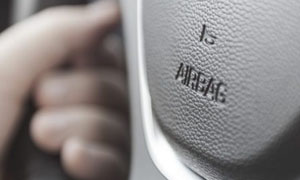 Most of us know to check the expiration of food products and pharmaceuticals to ensure our health and safety, but did you know that chemicals used to inflate airbags can also expire as they age?
Most of us know to check the expiration of food products and pharmaceuticals to ensure our health and safety, but did you know that chemicals used to inflate airbags can also expire as they age?
An independent testing panel made up of automotive company representatives has been assigned to investigate the Takata airbag crisis. They are now recommending that airbags should have a “use by” date because they degrade over time and their failure is a significant risk to safety.
“The very device that is supposed to protect you from harm can be the source of injury or death so it makes sense that these should be replaced periodically,” said James Johnson, a California lemon law and personal injury lawyer. “Replacing airbags, however, is costly for the consumer and auto makers so it will be interesting to see who bears this burden.”
Indeed, there are 10 confirmed death cases linked to the faulty airbags and more than 100 injuries that prompted the creation of this independent review panel.
The panel, which is made up of 10 representatives from Toyota, Subaru, Nissan, Mitsubishi, Mazda, General Motors, Ford, Honda, BMW and Fiat-Chrysler, reported there were multiple factors that contributed to the flawed airbags including humidity, the design of the product, problems during manufacturing as well as Takata’s use of a highly volatile chemical ammonium nitrate.
 Typically it’s not the airbag itself that degrades, but rather the chemicals in the inflator device that may fail or cause the airbags to explode sending potentially lethal metal fragments into the occupants. Takata ignored known risks involved with using this chemical and became the only airbag manufacturer to use the ammonium nitrate cartridges in its airbags. One of the problems with this chemical is it’s unable to absorb moisture. The airbags ultimately have prematurely inflated and exploded at times when there is high humidity present.
Typically it’s not the airbag itself that degrades, but rather the chemicals in the inflator device that may fail or cause the airbags to explode sending potentially lethal metal fragments into the occupants. Takata ignored known risks involved with using this chemical and became the only airbag manufacturer to use the ammonium nitrate cartridges in its airbags. One of the problems with this chemical is it’s unable to absorb moisture. The airbags ultimately have prematurely inflated and exploded at times when there is high humidity present.
The Senate Committee on Science, Commerce and Transportation reported that Takata may have manipulated test data on the faulty airbags and didn’t go far enough to protect consumers from the potential safety risk posed by the faulty designs. The Japanese-based company also continued to put consumers at risk by not fixing these problems in manufacturing even after it was levied roughly more than $200 million in fines and begun recalling millions of airbags.
HISTORY OF AIRBAGS: Airbags Save Lives, Standard Automotive Features
The first airbag was patented in 1951 by North American inventor John W. Hetrick, but it wasn’t until the 1970s that airbags were installed in some cars by a few manufacturers — starting with Ford and later General Motors — as a supplement to seat belts. By the1980s, airbags were catching on among automakers as a life-saving feature. Later dual airbags were mandated to be in all new vehicles by 1998 under the United States Intermodal Surface Transportation Efficiency Act of 1991. By 2000, many manufacturers began to install side curtain or torso airbags in their vehicles as an additional safety measure.
Johnson Attorneys Group Handles Cases Involving Defective Airbags
 How do you know if you have been injured in a crash due to a defective airbag? If the airbag falls apart and tears it cannot provide you with a protective safety cushion. This Auto manufacturers can be held accountable for failure to take steps to ensure the safety of consumers or by intentionally not disclosing potential harm to them.
How do you know if you have been injured in a crash due to a defective airbag? If the airbag falls apart and tears it cannot provide you with a protective safety cushion. This Auto manufacturers can be held accountable for failure to take steps to ensure the safety of consumers or by intentionally not disclosing potential harm to them.
Although accidents take place on a regular basis, many incidents could have been prevented if the manufacturer had taken steps to ensure the safety of consumers. When parts fail to perform properly, they can cause serious injuries to the drivers and passengers on the road. For example, if the air bag fails to deploy, a minor accident could result in severe injuries. On the other hand, if the air bag deploys without warning, serious damage could result to the driver or passengers of that vehicle. Another serious issue is brake-system failure. Brakes are the most important safety feature of any vehicle. When brakes do not operate in the proper manner, serious injury or death could occur.
Johnson Attorneys Group handles both personal injury and lemon law cases. Our law firm has experience with Takata Corp. and is accepting new cases at this time. Contact our firm for legal assistance at 800-235-6801 to request a free consultation.
- Ford Issues Major Recall for 229,000 Bronco and Bronco Sport Vehicles - December 2, 2025
- Is Your Car on Santa’s Naughty List? Recalls, Lemons, Safety Issues - November 25, 2025
- Toyota Recall for 127,000 Vehicles Over Engine Stalling Risk - November 13, 2025
